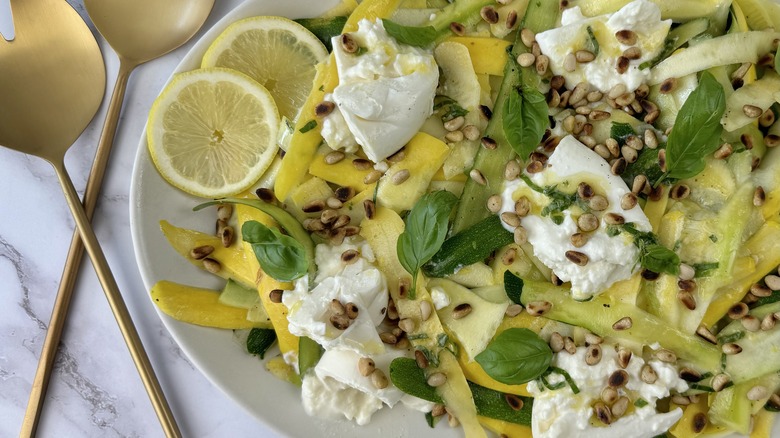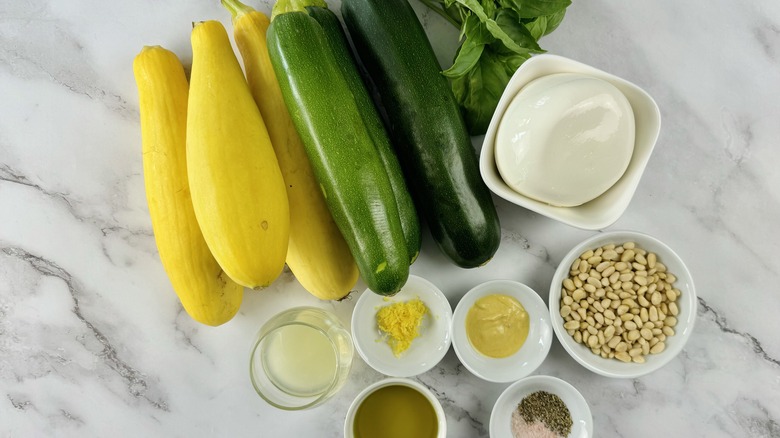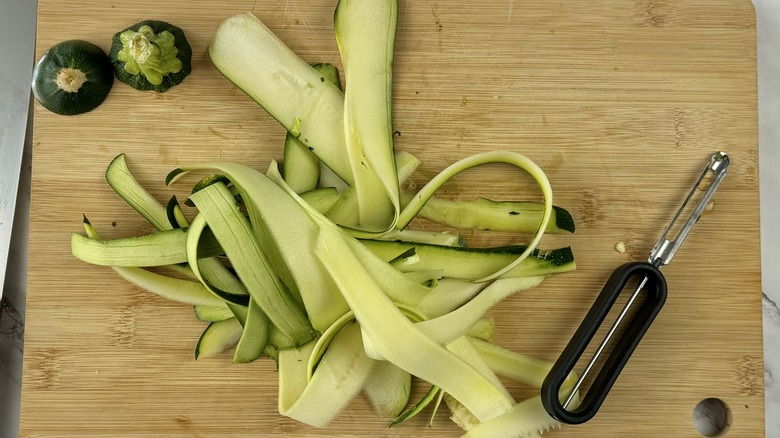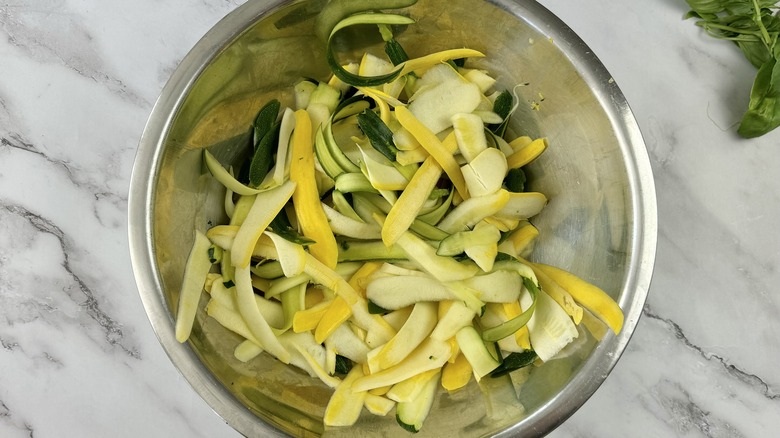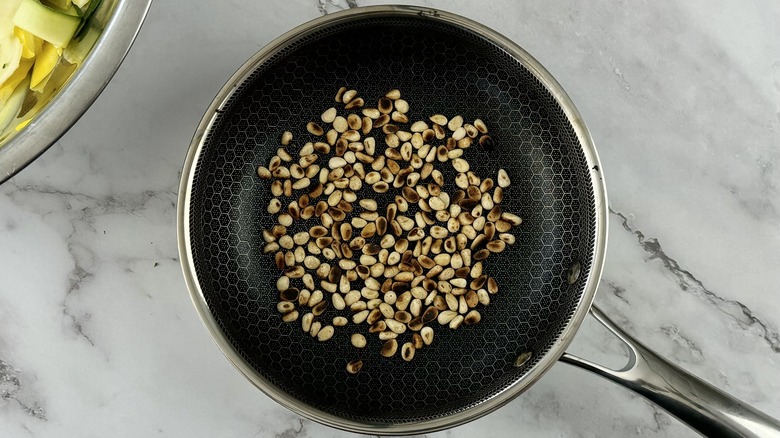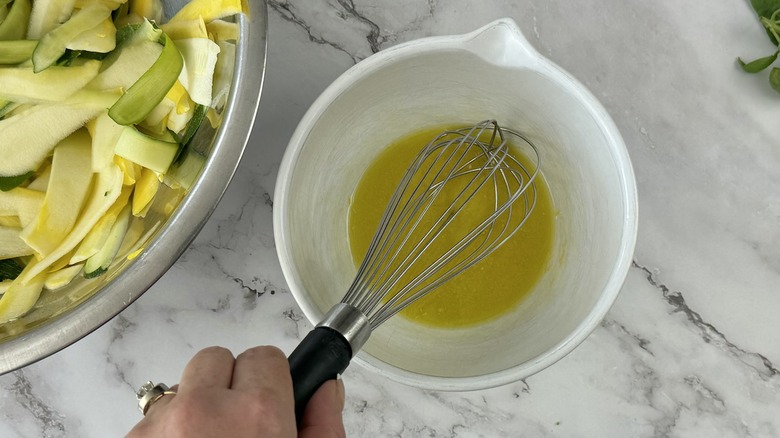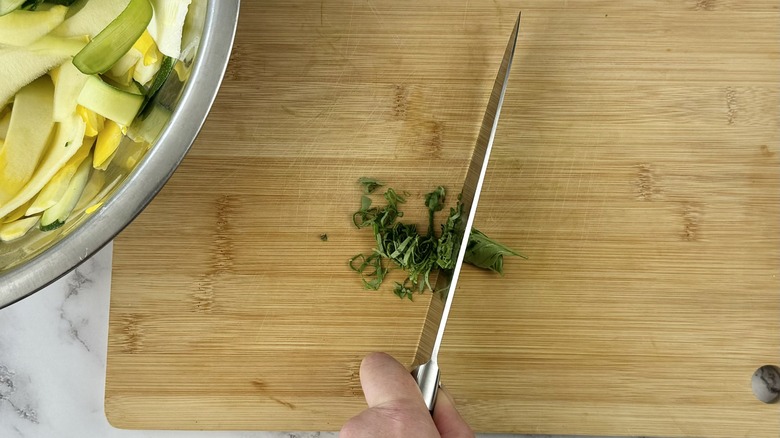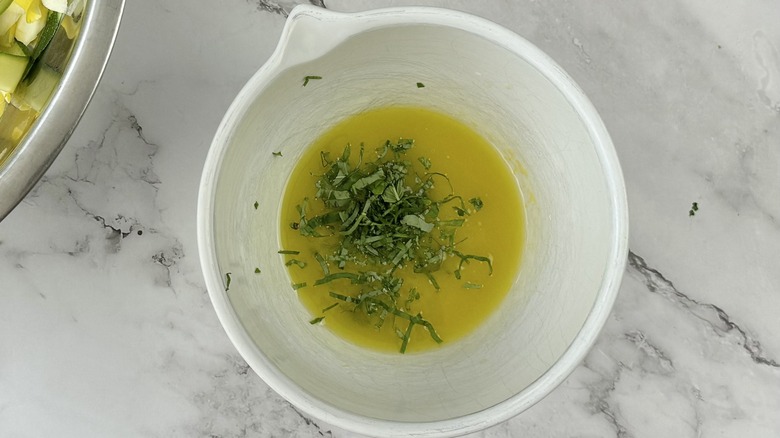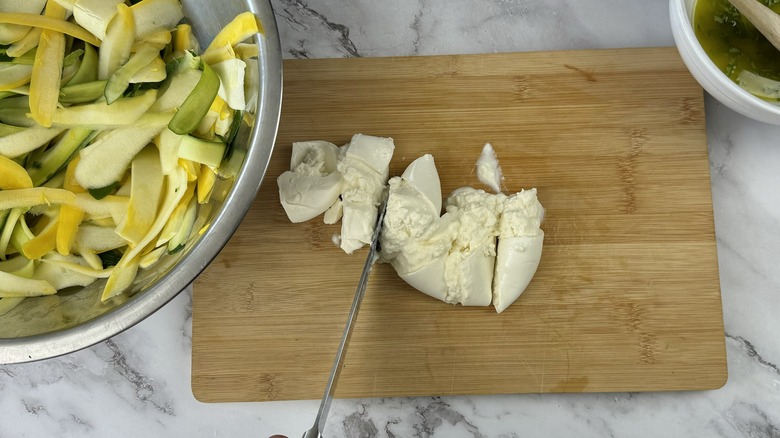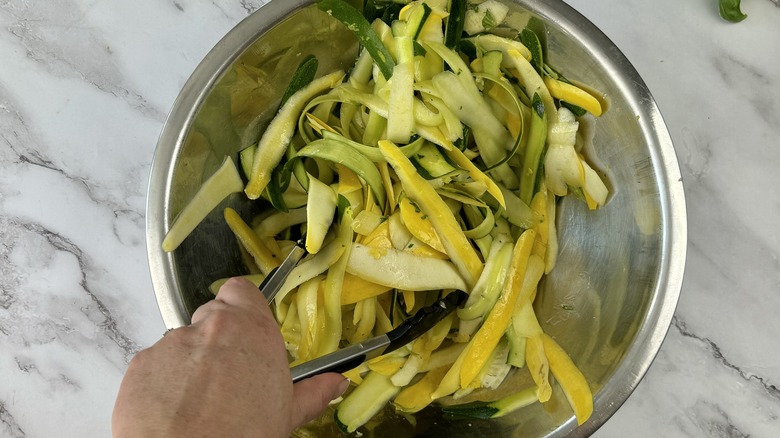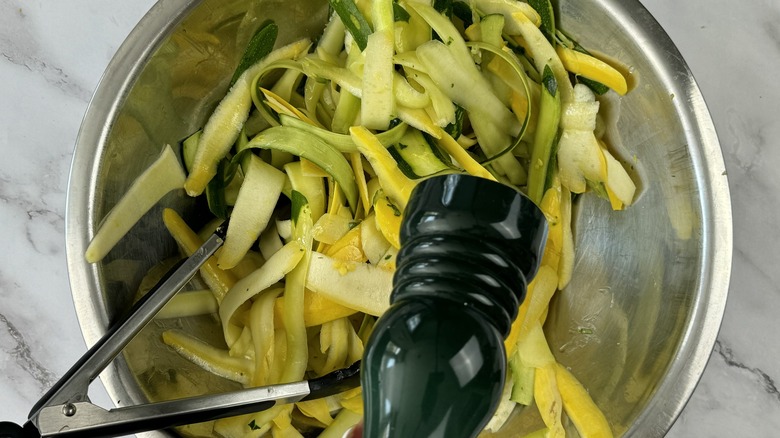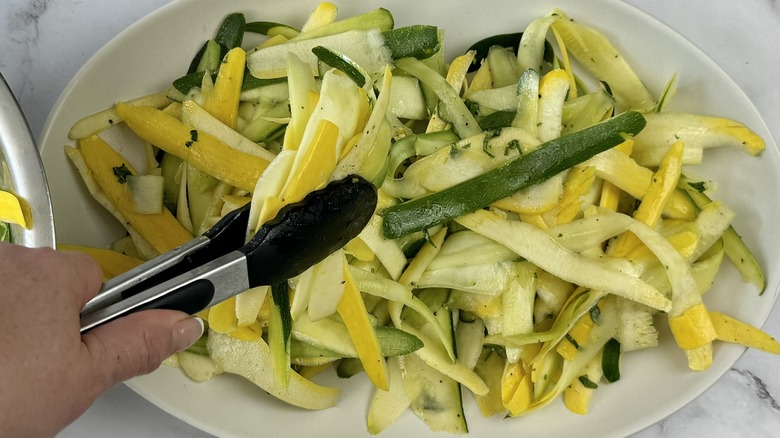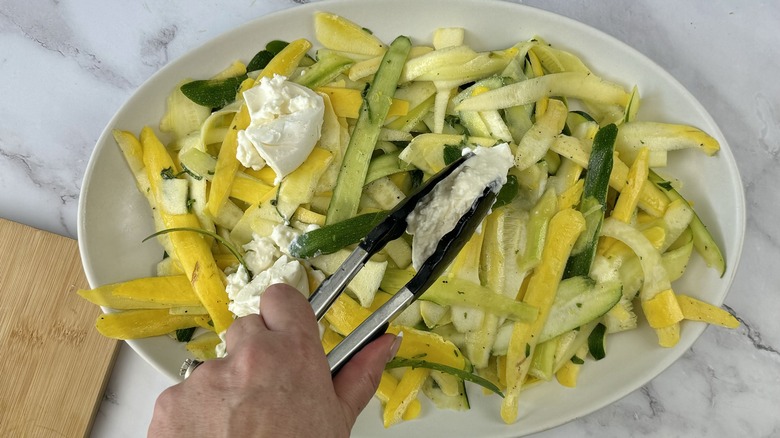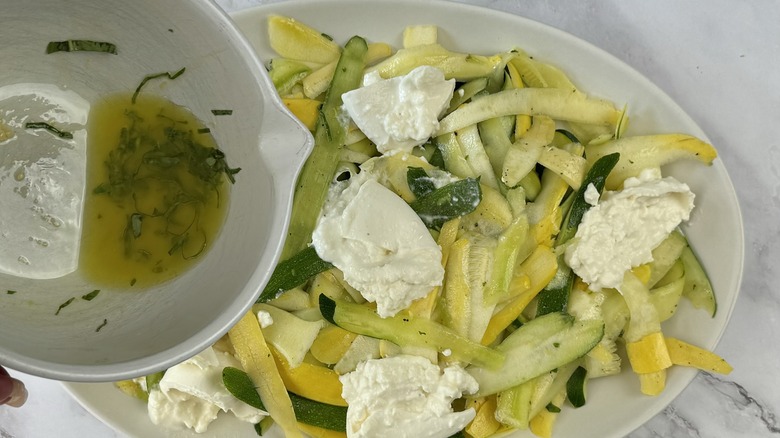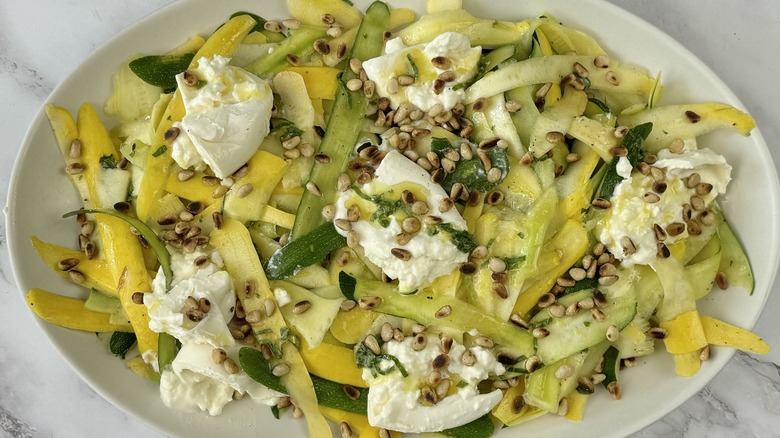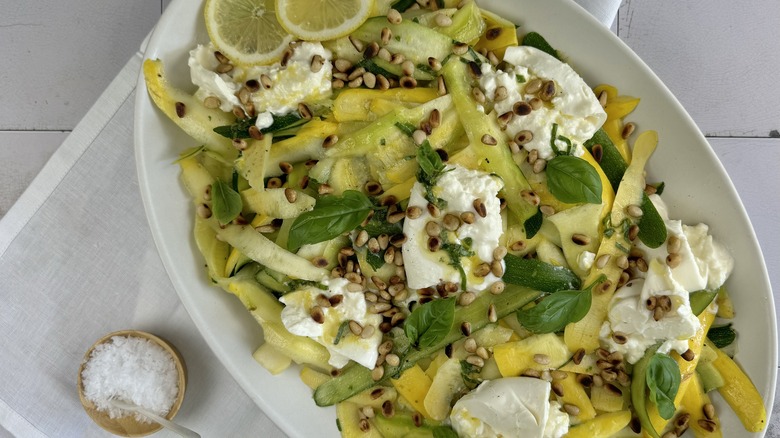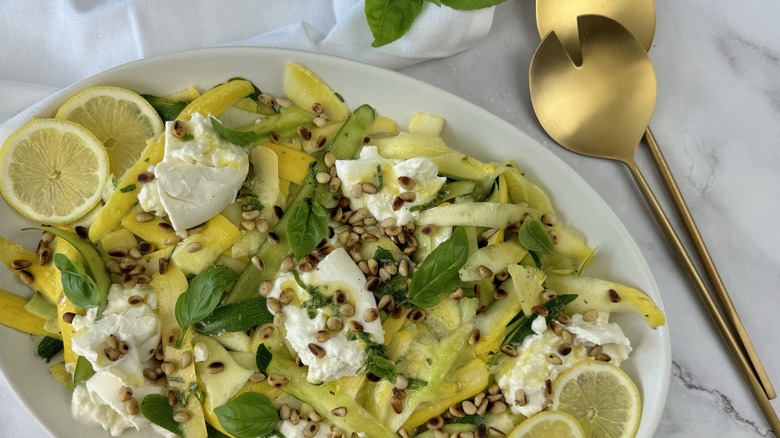Summer Squash And Basil Burrata Salad Recipe
Summer is the perfect time to prioritize dishes that feature plenty of colorful, fresh produce. Foodie recipe developer Julianne De Witt takes this notion to heart with her summer squash and basil burrata salad. This recipe boasts veggies, a tangy vinaigrette, and simple garnishes that come together into a vibrant dish you'll want to make regularly. "This light and colorful salad is very simple to put together," says De Witt. "It's the perfect summer side dish for whatever you're serving on the grill." For De Witt, that includes tasty protein mains, such as balsamic marinated chicken thighs or a simple ribeye, but you could pair it with grilled salmon, shrimp skewers, sausages, or even grilled tofu.
Instead of chunks or sliced rounds, De Witt recommends using a vegetable peeler or mandolin to make squash ribbons for a more rustic look. The center seeded part of the vegetable can be saved and repurposed in a quick stir-fry later in the week. This summer squash salad will keep for a few days in the fridge, but it's so delicious that it likely won't make it that long.
Gather the ingredients for summer squash and basil burrata salad
For this recipe, you'll need medium zucchini, yellow squash, and pine nuts. De Witt notes that any type of yellow summer squash works here, including yellow zucchini, crookneck, or zephyr. "Any kind of toasted nut would work well in this recipe — hazelnuts, almonds, pistachios," she says. "Pumpkin seeds would be nice, too."
To make the vinaigrette, grab extra-virgin olive oil, fresh lemon juice, Dijon mustard, lemon zest, basil leaves, salt, and pepper. Finally, you'll need burrata cheese and, if desired, basil leaves and lemon slices to garnish the salad.
Step 1: Peel the zucchini and squash
Using a vegetable peeler, peel the zucchini and yellow squash into thin strips.
Step 2: Add the vegetables to bowl
Place the zucchini and squash into a large bowl.
Step 3: Toast the pine nuts
Lightly toast the pine nuts in a small pan over low heat.
Step 4: Whisk the vinaigrette ingredients
Whisk together the olive oil, lemon juice, Dijon, and lemon zest.
Step 5: Prep the basil
Chiffonade the basil by stacking the leaves on top of one another, rolling them into a cylinder, and thinly slicing them crosswise.
Step 6: Combine the basil with the vinaigrette
Add the basil to the vinaigrette and stir.
Step 7: Slice the burrata
Slice the burrata into six portions.
Step 8: Toss the squash with the vinaigrette
Add half of the vinaigrette to the squash and toss.
Step 9: Season the squash
Season the squash, to taste, with salt and pepper.
Step 10: Plate the squash
Place the squash on a platter.
Step 11: Add the other salad ingredients
Top with the burrata and pine nuts.
Step 12: Top with the vinaigrette
Drizzle the remaining vinaigrette over the burrata.
Step 13: Garnish and serve
Garnish with lemon slices and more basil, if desired.
Summer Squash and Basil Burrata Salad Recipe
Ribboned summer squash is a fun and creative way to make use of the seasonal produce, and it tastes even better with creamy burrata and a citrusy dressing.
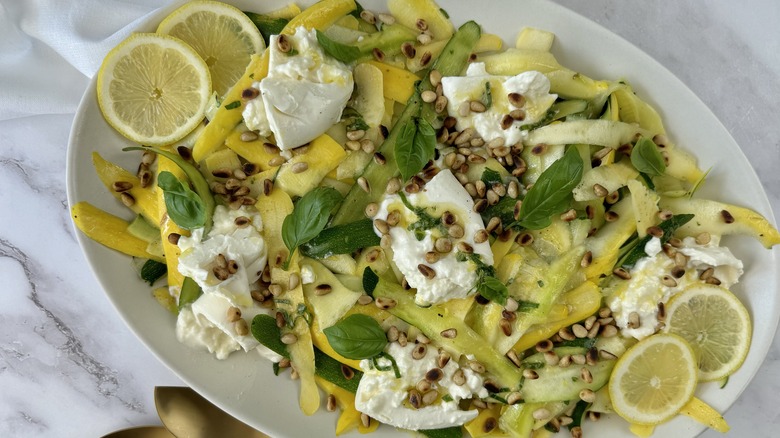
Ingredients
- 3 medium zucchini
- 3 yellow squash
- ¼ cup pine nuts
- ¼ cup extra-virgin olive oil
- 2 tablespoons fresh lemon juice
- 2 teaspoons Dijon mustard
- 1 teaspoon lemon zest
- 5 basil leaves
- Salt and pepper, to taste
- 8 ounces burrata
Optional Ingredients
- Basil leaves, for garnish
- Lemon slices, for garnish
Directions
- Using a vegetable peeler, peel the zucchini and yellow squash into thin strips.
- Place the zucchini and squash into a large bowl.
- Lightly toast the pine nuts in a small pan over low heat.
- Whisk together the olive oil, lemon juice, Dijon, and lemon zest.
- Chiffonade the basil by stacking the leaves on top of one another, rolling them into a cylinder, and thinly slicing them crosswise.
- Add the basil to the vinaigrette and stir.
- Slice the burrata into six portions.
- Add half of the vinaigrette to the squash and toss.
- Season the squash, to taste, with salt and pepper.
- Place the squash on a platter.
- Top with the burrata and pine nuts.
- Drizzle the remaining vinaigrette over the burrata.
- Garnish with lemon slices and more basil, if desired.
Nutrition
| Calories per Serving | 338 |
| Total Fat | 21.8 g |
| Saturated Fat | 6.9 g |
| Trans Fat | 0.0 g |
| Cholesterol | 29.9 mg |
| Total Carbohydrates | 28.3 g |
| Dietary Fiber | 4.8 g |
| Total Sugars | 2.8 g |
| Sodium | 871.0 mg |
| Protein | 12.3 g |
What is summer squash, and what some tips for buying and storing the vegetable?
De Witt distinguishes between summer squash and winter squash, with the latter category including acorn, spaghetti, and pumpkin. "Summer squash is harvested when it's immature and the rind is tender and edible," she explains, which allows the vegetable to be eaten raw. This contrasts with winter squash, which should be peeled, seeded, and cooked due to its hard, inedible rind.
When choosing summer squash at the supermarket or farmer's market, keep in mind that it comes in a wide variety of shapes and sizes. "Summer squash should have shiny skin. It should be firm and not spongy or dried out," De Witt says. Once you've selected your squash, it's important to preserve its freshness. "If you store summer squash in the crisper drawer of your refrigerator, it will last for up to a week. If you store it in a plastic bag with one end open for air circulation, it will last longer," she notes.
What is burrata, and what can I use as a replacement?
Fans of creamy textures are sure to love burrata, a type of Italian cow's milk cheese. De Witt describes it as having "a soft outer rind of mozzarella and a spreadable inside." It develops this dual texture through the production process. "Burrata is made by filling a ball of fresh mozzarella with stracciatella (a mixture of shredded mozzarella and heavy cream that's seasoned with salt) and then sealing the ball," she explains.
The contrasting textures add a fun element to this summer squash salad, while the mild and subtly sweet taste pairs well with the dish's flavor profile. If you can't source burrata from your grocery store or cheesemonger, De Witt recommends swapping in fresh mozzarella or bocconcini. Made with either cow milk, buffalo milk, or a mixture of the two, these alternatives provide a similar result. You'll just be missing the distinct consistencies in the outer and inner part of the cheese.
